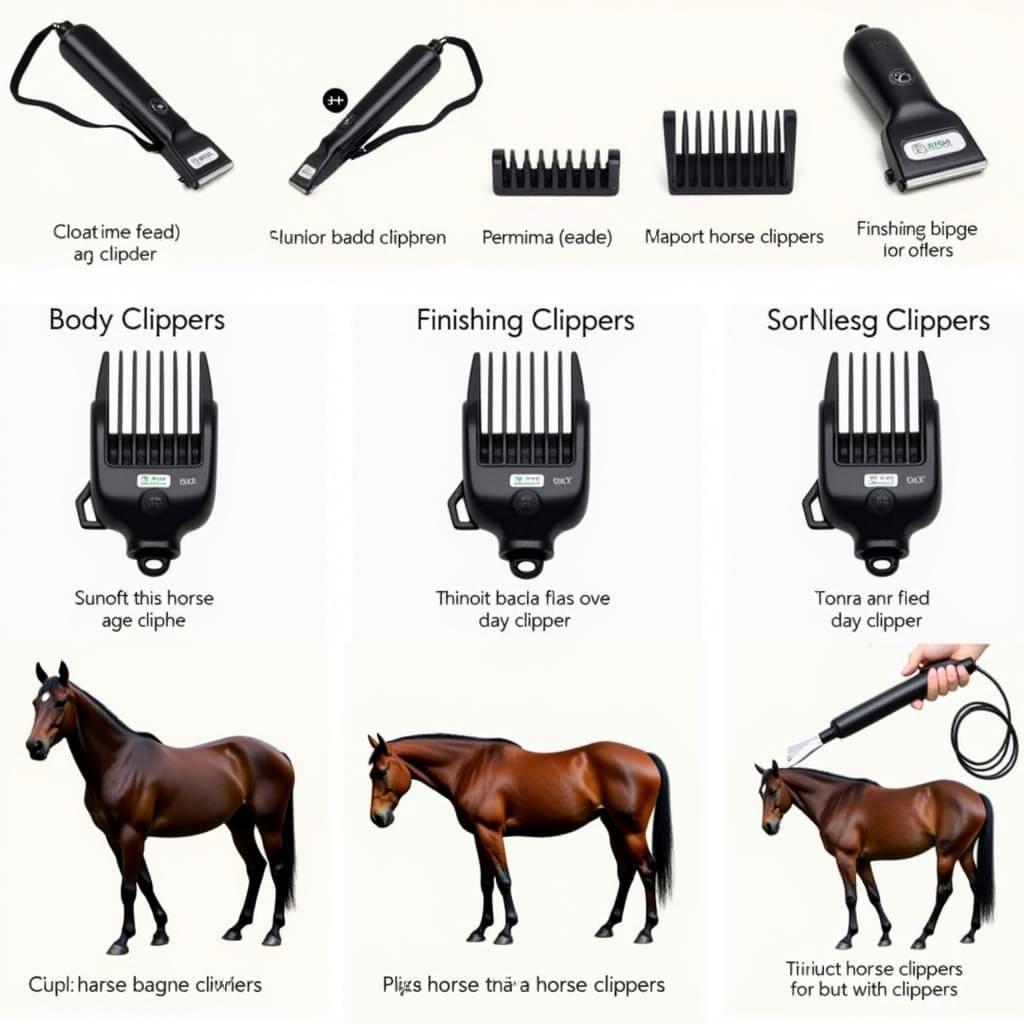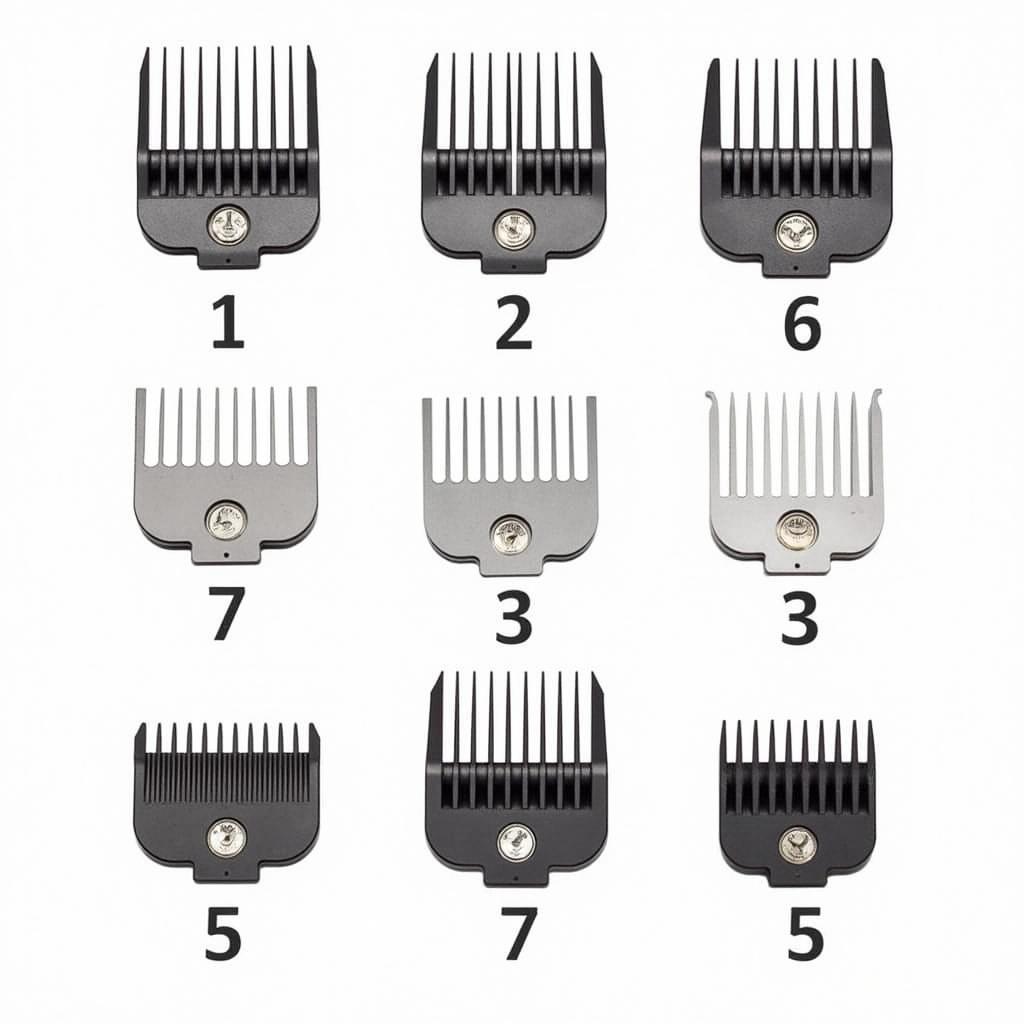Clippers For Horses are an essential tool for any horse owner, whether you’re a seasoned professional or a weekend rider. From maintaining a tidy appearance to addressing specific health concerns, the right clippers can make all the difference in your horse’s well-being and your grooming routine. Choosing the right pair, however, can be daunting given the variety of options available. This guide will delve into the different types of clippers for horses, their uses, and what factors to consider before making a purchase.
Choosing the best clippers for horses depends heavily on the type of clipping you’ll be doing and how often. Are you planning a full body clip, a trace clip, or just trimming bridle paths and fetlocks? Your clipping goals will directly influence the type of clipper power and blade size you’ll need. For instance, a heavy duty horse clippers is designed for full body clips and thick coats, while smaller, quieter clippers are better suited for detail work.
Types of Clippers for Horses
There are several types of horse clippers available, each with its own strengths and weaknesses. Understanding these differences will help you make an informed decision. Broadly, they can be categorized as:
- Body Clippers: These are powerful clippers designed for full body clipping and tackling thick winter coats. They are typically corded and offer consistent power. Horse body clippers are an investment for serious grooming.
- Finishing Clippers: Smaller and lighter than body clippers, finishing clippers are perfect for detail work like trimming bridle paths, fetlocks, and ears. They are often quieter, making them ideal for nervous horses.
- Cordless Clippers: These offer the convenience of portability and are great for trimming small areas or for use in areas without easy access to electricity. Look at our selection of cordless clippers for horses for a great mobile option.
Key Features to Consider
Beyond the basic types, several features differentiate various clippers for horses. Here are some key aspects to consider:
- Motor Power: Higher wattage generally means more power, which is important for thick coats and full body clips.
- Blade Speed: Faster blade speeds can make clipping quicker, but they can also generate more heat and noise.
- Noise Level: A quieter clipper can be crucial for horses that are sensitive to noise.
- Weight and Ergonomics: A comfortable grip and balanced weight are essential for extended clipping sessions.
- Durability and Maintenance: Invest in clippers made from durable materials that are easy to clean and maintain.
 Types of Horse Clippers
Types of Horse Clippers
Maintaining Your Clippers
Regular maintenance is crucial for ensuring the longevity and performance of your clippers. Always clean the blades after each use and oil them regularly. Sharpening or replacing blades when necessary will also ensure a smooth and efficient clip.
Proper storage is equally important. Store your clippers in a dry, cool place away from dust and moisture.
What’s the best way to clean horse clippers? A soft brush and blade wash are recommended for routine cleaning.
Choosing the Right Blades
Different blades are designed for different coat lengths and types of clipping. The lower the blade number, the shorter the hair will be clipped. For example, a #10 blade will leave a much shorter coat than a #40 blade.
 Horse Clipper Blades
Horse Clipper Blades
Clipping Tips for a Smooth Experience
- Always make sure your horse is clean and dry before clipping.
- Use sharp blades for a clean and efficient clip.
- Work in small sections and take breaks to avoid overheating the clippers.
- Be patient and work slowly, especially around sensitive areas.
- If your horse is nervous, start by desensitizing them to the sound and feel of the clippers.
What about Oster Clippers?
Oster is a well-known brand in the clipping world, offering a range of clippers for both horses and other animals. Horse clippers oster are known for their durability and performance. If you are looking for a reliable and trusted brand, Oster is a good option to consider.
Remember to secure your horse with proper equipment such as crossties for horses to ensure a safe and comfortable clipping experience.
Conclusion
Choosing the right clippers for horses is an important decision for any horse owner. By understanding the different types of clippers, their features, and how to maintain them, you can ensure a comfortable and efficient grooming experience for both you and your horse. Investing in quality clippers for horses will pay off in the long run, keeping your horse looking its best and contributing to its overall well-being.
FAQ
- How often should I clip my horse? This depends on your horse’s coat, activity level, and the climate.
- Can I clip my horse myself? Yes, with practice and the right equipment.
- What are the benefits of clipping a horse? Clipping can help regulate body temperature, improve performance, and make grooming easier.
- How do I choose the right blade for my horse? The blade number corresponds to the length of the hair left after clipping. Lower numbers mean shorter hair.
- How do I maintain my horse clippers? Regular cleaning, oiling, and blade sharpening are essential.
Common Clipping Scenarios
- The Show Horse: Requires meticulous clipping for a polished appearance.
- The Working Horse:** May benefit from a trace or blanket clip to manage sweat and body temperature.
- The Senior Horse: May require full body clips due to changes in coat growth.
Further Reading
Explore our articles on specific clipper types, such as cordless and heavy-duty models, for more detailed information.
Need assistance? Contact us at Phone: 0772127271, Email: [email protected] Or visit us at: QGM2+WX2, Vị Trung, Vị Thuỷ, Hậu Giang, Việt Nam. We have a 24/7 customer service team.